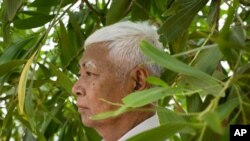When Khmer Rouge prison survivor Vann Nath died earlier this week in a quiet Phnom Penh clinic, family members had been scrambling for cash to pay for his treatment.
Staff at the Khmer Rouge tribunal pooled $500 to offset costs, as Vann Nath lay in a coma after a heart attack Aug. 26. Friends scrambled to collect money online. He died on Monday.
Meanwhile, the former Khmer Rouge leaders accused of widespread atrocity crimes and responsibility for the deaths of 1.7 million people are getting free health care with good doctors under the UN-backed tribunal. Vann Nath’s family members and other regime victims did not fail to notice.
“There should have been a doctor who did not charge him,” Vann Nath’s widow, Kith Eng, said this week. “But we had to find money to pay by ourselves instead. No person, nor the court, could help us. It was unjust for him.”
Vann Nath had supported himself after the fall of the regime with sales of his paintings, which depicted scenes he witnessed at Tuol Sleng prison, including the water-boarding and other torture of prisoners.
Chhum Mey, who with Vann Nath was one of seven known survivors of the prison, said detained leaders of the Khmer Rouge received “international” health services. “But for me, no,” he said. “They have full-time doctors, and that’s not the same as the victims."
He urged the court to speed its work, as it prepares for a trial next year of suspects Nuon Chea, Khieu Samphan, Ieng Sary and Ieng Thirith and as it decides on the final sentencing for Duch, who ran Tuol Sleng and was originally given a commuted sentence of 19 years.
“They are old,” Chhum Mey said. “I myself am 80 years old. How much longer will I live? We will not see the light of justice, just as Vann Nath didn’t, if court delays continue.”
The internal rules of the tribunal call for continued health care for suspects and has a similar provision for those who are accepted as legal victims of the regime, said Chhum Sophea, an officer with the court’s victims unit.
However, it is unclear how many use this, and there are many who consider themselves victims of the regime who do not receive such care.
“Certain victims don’t even have small change to get care for the simplest health problems,” said Chhang Youk, director of the Documentation Center of Cambodia, which researches Khmer Rouge atrocities. “Day by day, victims disappear without having justice.”




